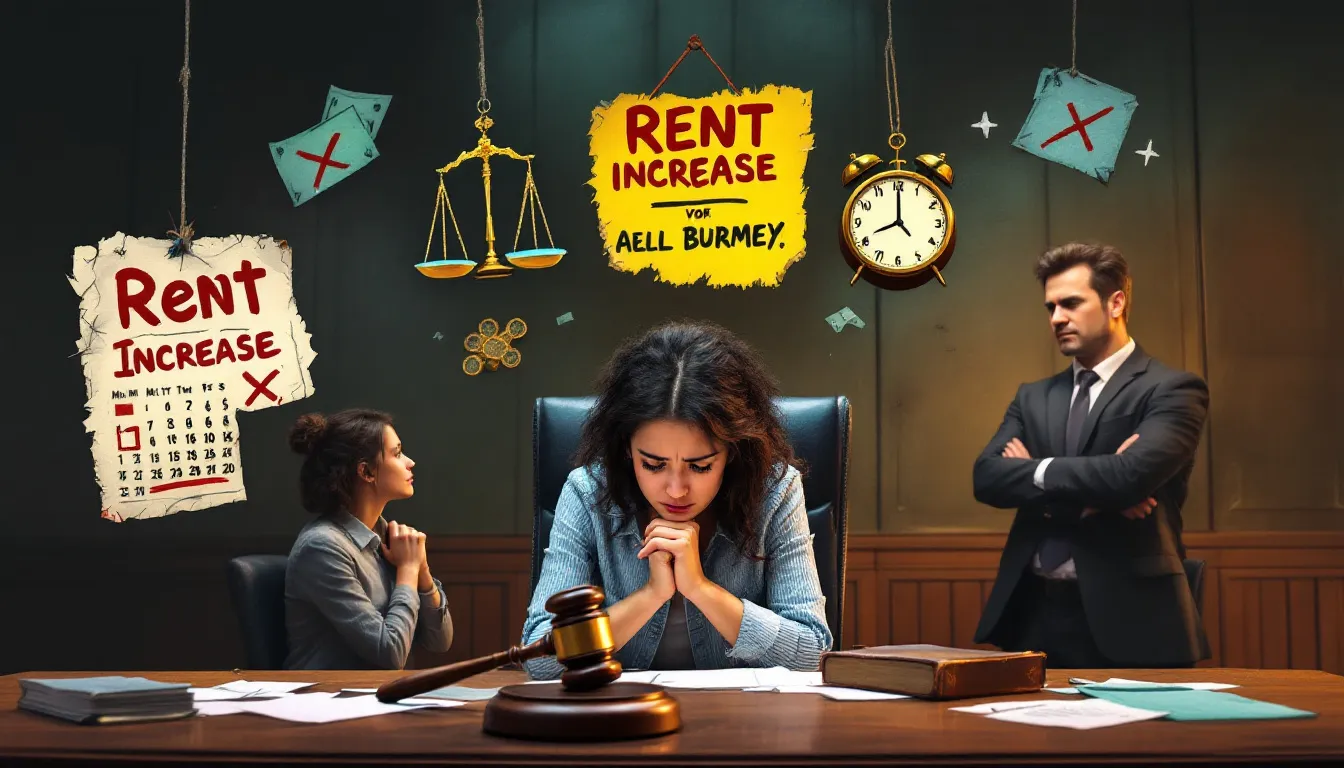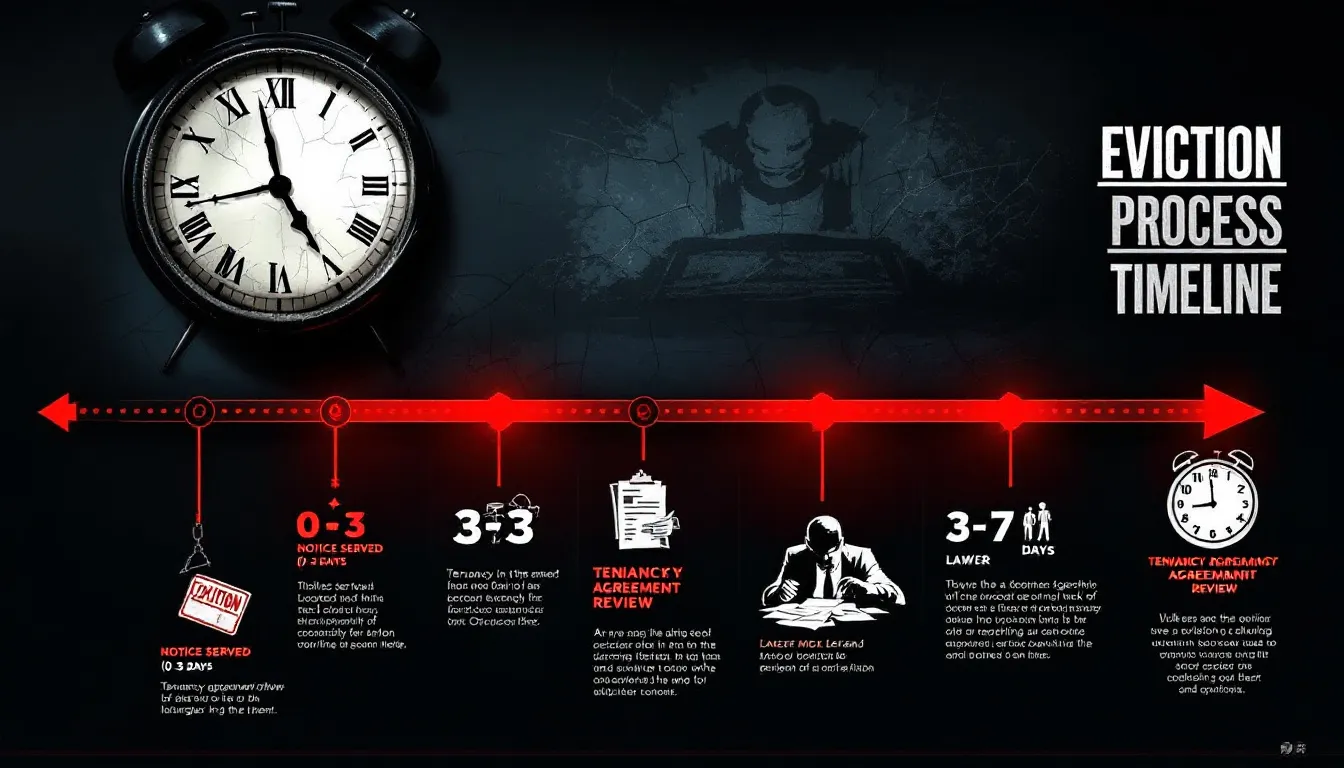How long does it take to evict a tenant? The timeline can range from 14 days to several months based on tenant cooperation, court schedules, and state laws. This article will guide you through each step of the eviction process, helping you understand what to expect.
Key Takeaways
The eviction process involves several key steps: issuing an eviction notice, filing a lawsuit, court hearing, and enforcing the judgment, each governed by specific state laws.
Factors such as tenant cooperation, court workload, and varying legal requirements can significantly influence the duration and cost of the eviction process, which may range from 14 days to several months.
Exploring alternatives to eviction, such as repayment plans and cash for keys agreements, can often lead to more amicable resolutions, saving landlords time and costs associated with formal eviction proceedings.
Understanding the Eviction Process Timeline
The whole eviction process involves several critical steps, each governed by state-specific laws and regulations. Landlords must begin by issuing an eviction notice to inform tenants of the need to vacate the property. This is followed by filing an eviction lawsuit if the tenant does not comply.
The next stage includes a court hearing and judgment, where both parties present their case during court proceedings. Finally, enforcing the judgment ensures the tenant vacates the property, often involving law enforcement.
Understanding these steps in detail can help landlords streamline the entire eviction process and avoid common pitfalls.
Issuing an Eviction Notice
The first essential step in the eviction process is issuing an eviction notice. Landlords must provide a clear, written notice to tenants, which varies depending on the reason for eviction. In New York, for instance, a landlord must give a 30-day written notice to terminate a month-to-month lease.
If the tenant violates the lease agreement, such as failing to pay rent, a tenant notice to vacate can be issued for lease violations. The notice period typically ranges from 7 to 30 days depending on state laws. Landlords must follow local and state eviction laws meticulously to avoid delays or legal repercussions.
Filing an Eviction Lawsuit
If the tenant does not vacate the property after the notice period expires, the next step is filing an eviction lawsuit. Submitting an unlawful detainer suit to the local court officially initiates the eviction process. A detailed timeline of all communications and actions taken can be vital for the legal proceedings.
Consulting an eviction attorney ensures compliance with legal standards and provides valuable strategies for moving forward legally and efficiently.
Court Hearing and Judgment
A court hearing is typically scheduled within 10 to 17 days after filing the eviction lawsuit. During the eviction hearing, both the landlord and the tenant present their evidence to the judge. The judge then makes a decision based on the presented facts. This stage is critical as it determines whether the landlord can proceed with the eviction or if the tenant will be allowed to stay.
Thorough preparation and legal process representation can significantly influence the outcome of the hearing.
Enforcing the Judgment
Once the court grants the eviction, landlords typically receive a Writ of Possession within a few hours to a few days. This writ gives tenants a final 72-hour notice to vacate the property.
If the tenant still does not leave, the landlord can enlist the help of law enforcement to physically remove the tenant and their belongings to evict a tenant. Enforcing the judgment ensures the property is vacated and ready for subsequent steps, such as cleaning and repairs.
Factors Affecting Eviction Duration

The duration of the eviction process can vary widely, influenced by several factors. Tenant cooperation, court workload, and legal requirements all play significant roles. The process can take anywhere from 14 days to several months, depending on these variables.
Recognizing these factors helps landlords set realistic expectations and prepare accordingly.
Tenant Cooperation
Tenant cooperation is a major factor in the eviction timeline. If a tenant complies with the eviction notice and vacates the property voluntarily, the process can be completed much faster. However, if the tenant resists, it can lead to prolonged court hearings and legal arguments, significantly slowing down the proceedings.
No legal shortcut exists to expedite the eviction if the tenant refuses to leave. Fostering a cooperative relationship with the tenant can be beneficial.
Court Workload
The local court’s workload also impacts the eviction process duration. An increase in the number of pending cases can lead to longer wait times for court hearings and judgments. This means that in busier jurisdictions, landlords might experience delays even after filing all necessary paperwork.
Awareness of the court’s schedule helps landlords anticipate potential delays and plan accordingly.
Legal Requirements
Legal requirements vary by state and can affect how quickly an eviction can be processed. Landlords must be familiar with local laws to ensure compliance. Hiring an attorney can help navigate these complex legal landscapes, although it can add to the overall cost.
Maintaining a thorough paper trail, including payment receipts and incident reports, substantiates the landlord’s claims during eviction proceedings.
Costs Involved in Evicting a Tenant

Evicting a tenant can be an expensive endeavor. Costs typically include court filing fees, attorney fees, and additional expenses for services like process serving and law enforcement assistance. On average, the total cost for evicting a residential tenant can be around $3,500.
Exploring alternatives to eviction can save both time and money.
Filing Fees
Filing fees are one of the initial costs landlords incur when starting the eviction process. These fees can range from $50 to $500, depending on the jurisdiction and the complexity of the case.
Knowing these costs upfront helps landlords budget appropriately and avoid unexpected expenses.
Attorney Fees
Attorney fees can vary significantly, often influenced by the complexity of the eviction case and the attorney’s billing practices. Legal representation is crucial for navigating the eviction process, especially in complex cases. These fees can range from $500 to $5,000, so landlords should consider these costs when planning an eviction.
Additional Costs
Landlords may incur additional costs during the eviction process beyond filing and attorney fees. These can include service of process fees ranging from $50 to $150, and costs for law enforcement assistance, typically around $75 plus mileage charges.
Document preparation and court filing fees can also add up, so landlords should be aware of all potential expenses.
Alternatives to Eviction

Exploring alternatives to eviction can benefit both landlords and tenants. Options such as repayment plans, mutual lease termination, and cash for keys agreements can resolve disputes more amicably and often more quickly than formal eviction proceedings.
Repayment Plans
Establishing a repayment plan allows tenants to catch up on unpaid rent over an agreed period while paying rent. This approach can prevent eviction and maintain a positive landlord-tenant relationship.
This win-win solution ensures landlords eventually receive the owed rent while allowing tenants to remain in their homes.
Mutual Lease Termination
Mutual lease termination involves both parties agreeing to end the lease early. This can be a favorable alternative to eviction, particularly if the tenant understands the impact of eviction on their credit score and rental history.
Agreeing to terminate the lease allows both parties to avoid the time and costs associated with the eviction process.
Cash for Keys Agreements
Cash for keys agreements offer financial incentives to tenants in exchange for vacating the property. This method can be faster and less costly than formal eviction proceedings.
These agreements provide tenants with funds to facilitate their move, making it easier for them to leave and allowing landlords to regain possession of their property quickly.
What Happens After Eviction?
After an eviction, landlords must address several post-eviction tasks. These include collecting unpaid rent, dealing with abandoned property, and cleaning and repairing the property to prepare for new tenants.
Collecting Unpaid Rent
To collect unpaid rent after an eviction, landlords must request a money judgment in the eviction complaint. This judgment allows landlords to seize funds directly from the tenant’s bank account or garnish wages.
Accurate record-keeping of tenant payments and communications is essential for defending against possible disputes.
Dealing with Abandoned Property
Landlords often encounter abandoned property left behind by evicted tenants. They are usually required to provide written notice before disposing of these belongings.
Handling abandoned property properly ensures compliance with the law and avoids potential legal issues.
Cleaning and Repairing the Property
Cleaning and repairing the property after an eviction prepares it for new tenants. This includes addressing any damages, conducting necessary maintenance, and enhancing the property’s overall appearance.
Maintaining the rental property properly not only attracts new tenants but also preserves its long-term value.
How to Avoid Common Eviction Pitfalls
Avoiding common pitfalls can make the eviction process smoother and more efficient. Key strategies involve maintaining proper documentation, following legal procedures, and seeking legal advice when necessary.
Proper Documentation
Proper documentation is crucial throughout the eviction process. Keeping records of lease agreements, payment receipts, and communications ensures compliance with legal requirements and substantiates the landlord’s claims in court.
This documentation serves as vital evidence during hearings.
Following Legal Procedures
Diligently following legal procedures avoids delays and legal issues during the eviction process. Landlords must comply with all legal requirements and avoid trying to evict tenants for unlawful reasons.
Consulting an attorney can help landlords understand their rights and obligations.
Seeking Legal Advice
Seeking legal advice before initiating an eviction helps landlords navigate complex jurisdiction-specific laws. Legal counsel can provide guidance on the best strategies and ensure that the eviction process is conducted legally and efficiently.
Summary
Summarizing the key points from the guide, this section will reinforce the importance of understanding the eviction process, exploring alternatives, and following legal procedures. It will offer final thoughts to inspire and reassure landlords facing eviction challenges.
Frequently Asked Questions
How long does the entire eviction process typically take?
The entire eviction process typically takes between 14 days to several months, contingent upon tenant cooperation, court workload, and compliance with legal requirements. It is advisable to be prepared for potential delays.
What initial steps should I take to evict a tenant?
To initiate the eviction process, you should issue a clear, written eviction notice to the tenant, detailing the reason for eviction and the required notice period. This sets the foundation for further legal proceedings if necessary.
What are the costs involved in evicting a tenant?
Evicting a tenant typically incurs costs such as court filing fees, attorney fees, process serving, and potential law enforcement assistance, averaging approximately $3,500. It is crucial to budget for these expenses when considering eviction.
Are there alternatives to formal eviction proceedings?
Yes, alternatives to formal eviction proceedings such as repayment plans, mutual lease termination, and cash for keys agreements can provide quicker and more cost-effective solutions. Consider these options to resolve tenant issues amicably.
What should I do if a tenant leaves behind personal belongings after eviction?
If a tenant leaves behind personal belongings after eviction, you must provide written notice before disposing of the items to fulfill legal obligations. This ensures compliance with applicable laws and protects your rights as a landlord.
Dave is a seasoned real estate investor with over 12 years of experience in the industry. Specializing in single-family residential real estate, David’s strategic approach combines market analysis, financial acumen, and a deep understanding of urban development trends to maximize investment returns.










